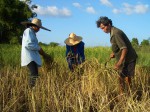News
2016-11-07 | permalink
Pat Mooney: Peasant systems are more innovative than industrial agriculture
 The peasant system is more flexible (Photo: www.pixelio.de, Manfred Schütze/pixelio.de)
The peasant system is more flexible (Photo: www.pixelio.de, Manfred Schütze/pixelio.de)
Small-scale farmers are more successful in feeding the world than industrial food systems. The reason is that peasant systems are more innovative, diverse and flexible, says Pat Mooney, recipient of the Right Livelihood Award and Executive Director of ETC Group, a civil society organization headquartered in Canada. On October 25, Mooney took part in an event in Berlin to mark the launch of the “Right to Food and Nutrition Watch 2016”, an annual report published by FIAN, ICCO and Brot für die Welt. This year’s Watch warns that peasant seeds systems and agricultural biodiversity are under threat as a result of increasing corporate pressure. In an interview after the event, Mooney talked about the future of food and farming and the new wave of giant mergers, such as Bayer’s takeover of Monsanto, which according to Mooney are not just about seeds and pesticides but also about who will control Big Data in agriculture. “They already made some arrangements there and realize that they can make the next step of mergers,” he said. “They will use the same arguments they use now, they will say ‘World hunger requires we do this, climate change requires we do this, we must be able to scale up to respond to this crisis, let us take advantage of the technologies, the big data technologies, to put it all together.” However, it is not agribusiness but small-scale farmers who are key to feeding the world and who are better prepared to meet the challenges of climate change, argues Mooney. He thinks that peasant systems are more efficient. “One of the reasons why peasants are so successful at producing and providing food for the world, especially for hungry people, is because the industrial system is so bad at doing it. For every Euro that is spent by consumers in industrialized countries on the industrial food chain, they spend two more Euros in covering the damages, the health and environmental damages of that same industrial food chain.” In addition, the system is inefficient since a large share of food does not make it from farm to table. Apart from that, Mooney considers the peasant system as the better option “because it is the most flexible, it has the most diversity in it and it is the most able to adapt to changes quickly”. Mooney criticised that the industrial system puts a large amount of research and development resources into just one crop: corn. “That is a terribly non-innovative system – we can’t just live on corn in the future. Peasants are working with 6,883 crops. They have much more diversity to work with.” According to Mooney, the history of farmer’s capacity to adjust to climate change is incredible. “For example peasants in Africa, in the course of a century, adapted corn as a new crop to 17 different microclimates around Africa – in only one century! The ability to adapt rapidly to new conditions, and even involve new species, is very high in the peasant system,” says Mooney. (ab)

